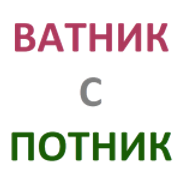Marto написа:jovani написа: аз отдавна съм го казал, че проблемът не е в комунизма или капитализма пер се, а във вградените недостатъци в хората.
Напротив, точно там е проблема: комунизмът (и другите разновидности централно контролирани икономики) изостря негативните последствия на човешките "недостатъци", докато капитализмът ги превръща до голяма степен в положителни атрибути. Прогресивното човечество така и не можа да разбере, че реалните последствия от двете системи са обикновено диаметрално противоположни на лозунгите на съответните им привърженици.
Тоест, моите аморални (а според някои дори неморални) изказвания по икономическите въпроси са всъщност върховен израз на човеколюбие. Не се майтапя

Глупости си написал, както обикновенно. Демонстрираш непознания в областта на полит-икономиката. Комунизмът и тоталитаризмът не са синоними. Комунизъм може да има при наличие на демокрация, както и капитализъм при наличие на авторитаризъм (или неговите варианти - тоталитаризъм, фашизъм и пр.).
Моето мнение е, че дивият капитализъм от началото на миналият век доведе до левите движения, които от своя страна промениха системата - с помощта на социални закони, пролиферация на профсъюзи и пр. "Борба и единство на противоположностите"

А мненията ти много ми напомнят на Кевин О'Лиъри. Интересното е, че този индивид на много други места по света би лежал в затвора за деянията си, докато в Канада се води за бизнес гений и даже има предаване по телевизията.
http://en.wikipedia.org/wiki/Kevin_O'Leary.
"In 1999, The Learning Company and its 467 software titles were acquired by Mattel in a $3.2 billion stock swap.[7] Sales and earnings for Mattel soon dropped, and O'Leary departed from Mattel.
The purchase by Mattel was later called one of the most disastrous acquisitions in history.[8]"
http://en.wikipedia.org/wiki/Mattel
"In May 1999, at the height of the dot-com bubble, Mattel acquired The Learning Company
for $3.5 billion in stock[5] or 4.5 times annual sales.[6] The Learning Company was considered at the time one of the leading entertainment and educational software companies, owner of such titles as Reader Rabbit, Carmen Sandiego, Myst, Riven, and National Geographic,[7] but had in 1997 accumulated losses of $475 million.[8] Mattel thought that this acquisition would help business diversification by giving the company a leading position in the market of consumer software.[9] Mattel CEO Jill Barad expected to have direct internet sales for all Mattel's toys and predicted that Mattel sales over the Internet would reach $1 billion in a few years.[8]
In the third quarter of 1999, Mattel expected The Learning Company to post $50 million in profits but in reality it posted losses of $105 million.[6] Despite this loss, CEO Jill Barad continued to be optimistic. Things worsened in the fourth quarter, as The Learning Company's pre-tax losses reached $183 million. For the year The Learning Company's pre-taxes losses were $206 million,[10] on revenues of $750 million.[9] The Learning Company's losses depressed Mattel's 1999 profits and as a result, Mattel posted a $82 million net loss compared to a $206 million net income in 1998.[10] Mattel also warned that it would take a revamping charge of $75 million to $100 million in the first quarter of 2000 because of The Learning Company.[11]
By 2000, Mattel was losing $1.5 million a day with The Learning Company,[12] and Mattel's stock price (which reached a high of $45 in March 1998) traded at $11 in February 2000.[11] Under pressure, on February 3, Mattel's CEO Jill Barad resigned but received a $50 million severance package.[13] In April Mattel announced that it was selling The Learning Company; analysts predicted that The Learning Company could be sold for $400 million, then for $200 million.[5]
In the end, in October, The Learning Company was sold to Gores Technology for nothing other than a percentage of The Learning Company's future profits.[13] In addition Mattel cut 10% of its workforce to further cut costs.[13] As a result of this restructuring Mattel posted a net loss of $430 million for the year 2000.[14]"
"In December 2002, Mattel announcing a $122-million settlement with shareholders over its purchase of Learning Co.[16] The company's stock is estimated to have fallen more than 65% as a result of the acquisition,[16]
losing an estimated $2.5 billion in shareholder value.[17] CEO Jill Barad, who presided over the acquisition left Mattel
with $50-million severance package for two years of employment, said to be unpopular with shareholders.[16]"
Между другото тези, които имат желание да дойдат в Канада горещо бих препоръчал да гледат шоуто "Драгонс Ден" - много биха научили за това как се водят бизнес преговори при наличие на слаба - силна страна.Глупавите хора си повтарят грешките, умните не, а мъдрите се учат от чуждите такива.
Някои хора се нагаждат към околната среда, други променят средата според себе си.
Има три вида хора: такива, които могат да броят и такива, които не могат...






